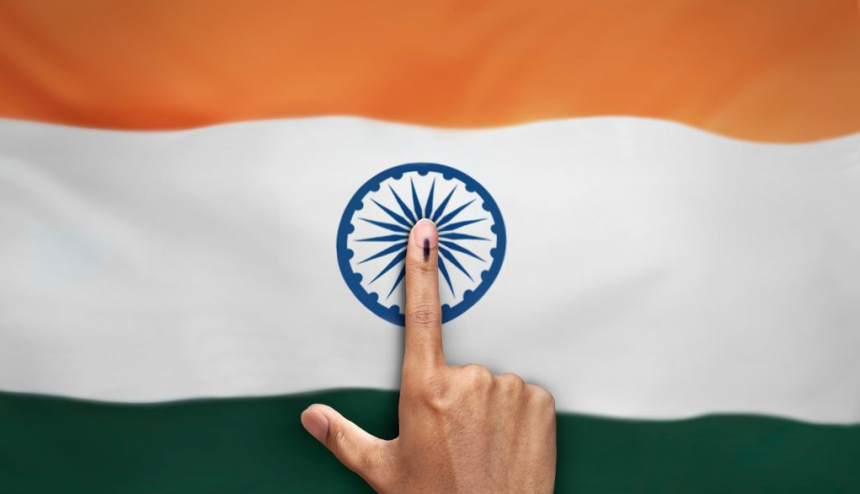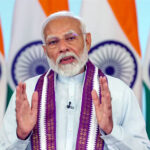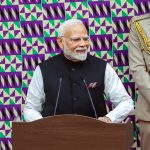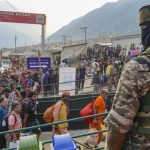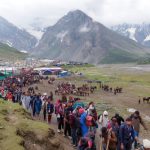Election and voting are the most commonly used terms in contemporary age of democratic politics. The ever increasing popularity of democratic theory and practice has even made them household names. These terms refer to a process of democratic participation in which all the people above 18 years of age express their opinion (assent or dissent) about government functioning and its decisions, policies and programmes of various political parties, quality of candidates in fray and the parties they belong to through ballot. It is only voting that gives people a sense of ownership of government and by virtue of voting the idea and philosophy of democracy given by Abraham Lincoln – government of the people, by the people and for the people, is understood. By participation in elections through ballot every citizen becomes a stakeholder in government formation and thereby decides the direction of change and development of the country or the state whichever is the case.
The importance of vote and its free and fair exercise is best known to persons who have experienced subjugation and deprivation at the hands of colonial powers. It is seldom acknowledged by persons borne free. The Indian subcontinent remained under British rule for about 200 years. The people had no right to live a dignified life, and were treated like non-living or inferior creatures by the Lords. Research conducted by an economic historian Robert C. Allen reveals that extreme poverty in India increased under British rule, from 23 percent in 1810 to more than 50 percent in the mid-20th century. Real wages declined during the British colonial period, reaching a nadir in the 19th century, while quality of life as a whole deteriorated to its worst. Experts agree that the period from 1880 to 1920 – the height of Britain’s imperial power – was particularly devastating.
India got freedom in 1947 and became a sovereign democratic Republic in 1950. The whole nation is indebted to all those who played their role in freedom struggle and gave us the opportunity to live a free life and form our own government. However, freedom and power bring responsibility. The biggest responsibility on the people of India, especially youth, is to attain knowledge and work hard in every field, and encourage sincere leadership having clear vision and mission within the framework of constitution so that the dream of secular India becoming a torch bearer for the whole world is realized.
Mahatma Gandhi has said, “I understand democracy as something that gives the weak the same chance as the strong”. In response to a question, “Why should we vote when no candidate is worth to be voted for”? posed by a group of students, hailing from different states, at Rupnagar (formerly Ropar) Punjab on 20th of March 2014 to Dr. A.P.J Abdul Kalam; the ‘People’s President’ said, “You have to choose the best candidate among the contestants based on their work and contribution to the society. Remember, your ‘right to vote’ is precious and exercise of this franchise is very essential as you have a great opportunity to select the right person to represent you in the parliament or in the assembly. The nation will be grateful to you if you cast your vote to the right candidate” (Write up of the former President available at: https://ceojk.nic.in).
Our vote decides our future. It is the moral responsibility of political parties, on one hand, to persuade and nominate the people with unblemished character, and passion to work for the masses irrespective of their social, economic and political status, and their affiliation to any religion, caste or creed, as candidates in the upcoming assembly elections, and on the other hand, it is incumbent upon the electorate to vote for the best. In India, political parties, while nominating candidates for contesting elections do not follow morality based model code of conduct by rejecting people with criminal record, and similarly, the electorate while voting for the candidate are lured away by hollow slogans and political propaganda staged around caste, race, region and religion. The results are shameful and shocking. As many as 170 (31%) members of the current 18th Lok Sabha are facing serious criminal cases including rape, murder, attempt to murder, kidnapping and crimes against women (ADR report, 2024).
It is only the power of vote that made Rishi Sunak assume the office of British PM in 2022 whose ancestors in British India like other Indian were barred by British colonials from entering clubs and restaurants meant for whites. The vote turned the tables and London’s 10 Downing Street palatial building was occupied by Mr. Sunak as his office-cum-residence.
The term ‘voting behaviour’ also known as ‘electoral behaviour’ is not new. But it has been used of late to describe certain areas of study and types of political phenomena which previously had either not been conceived or were considered irrelevant (Eldersveld, S.J. 1951). It involves an analysis of individuals’ psychological processes (perception, emotion, and motivation) and their relation to political actions as well as of institutional patterns, such as the communication processes and their impact on election. It is, in fact, a field of study concerned with the ways in which people tend to vote in election and the reasons why they vote as they do.
The study of voting/electoral behaviour constitutes a very significant area of empirical investigation that takes the subjects of politics very close to the discipline of sociology with the result that a new dimension of advanced study, rather a discipline, is becoming more and more popular with the name of political sociology or sociological politics. Man is a rational creature in the philosophical sense of term; he is not so rational in the realms of his economic and political behaviour. An empirical study of the electoral behaviour displays the astounding fact that the behaviour of man is influenced by several irrational forces. The role of political parties and pressure groups in invoking religious and communal factors, influence of money or charismatic personality of a leader and a host of other irrational forces have their definite influence on the minds of the voters. The role of these irrational forces can be discovered or discerned if we pay our attention on how the favourable election results have been obtained since the inception of electoral politics. This fact applies to every democratic system and, as such, India is no exception.
Elections are an expression of democratic class struggle through voting. Major differences in the political allegiances of different age groups, classes, education levels, religious beliefs or ethnic groups have been reported by voting survey. Voting for right or left depends upon a person’s life experiences and interests. However, keeping the case of Indian voting behaviour in view, Prof.V.M.Sirsikar, India’s well known political scientist, observes: “An enquiry into the process of election indicates factors other than rationality”. There are various determinants of voting behaviour such as religion, caste, class, community, ethnicity, language, ideology, guarantees, political wave etc. The political parties use these determinants to attract voters for winning the election. These determinants, or in simple terms baits, are used by all the political parties to woo voters for registering their victory. The determinants for wooing the voters change with space and time and politicians are highly qualified and experienced in selecting and propagating the most suited. People definitely get influenced by the political baits offered to them, which are sometimes clandestine and personal; however, many people in society modify their vote decisions the night before an election for a variety of reasons ranging from high level psychological counselling by friends and close relatives to unfair means of abysmal grade.
Of all the possible behaviours a person displays in the course of his/her life; only few may have as many implications as the behaviour of voting for a party or an independent individual in an election. By casting a vote, the voter directly or indirectly, lays down a course of action for parliaments/ legislative assemblies of the country/ state he or she inhabits. Through elections, leaders have risen to power that dramatically changed the course of world politics and initiated policies affecting the daily lives of millions. If our vote helps a pious person to reach to the top we will be rewarded and if it does otherwise we will be punished. Allah (SWT) has categorically commanded in glorious book of Quran (3:58) to render back our trusts (support) to those only whom they are due. Vote is not only a power but a trust reposed by Allah (SWT) to mankind; so we should cast it wisely in favour of the most superior and God-fearing lest we will be answerable for electoral misconduct on the day of judgement.
The qualities of a genuine and great political leader to be voted for includes integrity, courage, respect for others, humility, compassion, selflessness, vision, learning agility, collaboration, communication and resilience and the party to which the candidate belongs should also embody all the above characters. Alas! Very few leaders possess all these characters; those who possess, they except for a few, lose some important ones like respect for others, humility, compassion and selflessness especially after attaining the power. In his book ‘In Sickness and In Power’, David Owen narrates the mental and physical health problems that the great leaders of the twentieth century had, especially the so-called Hubris Syndrome, a temporary disorder suffered by people with power, characterized by the exaltation of the ego, excessiveness, contempt for the opinion of others, loss of contact with reality, and other problems that lead to self-destruction. It is appalling. The political leaders of 21st century need to revisit and redefine their behaviour post victory and try to develop immunity against this syndrome, which is very common even today; otherwise their perpetuation and growth in politics can’t be guaranteed.
The Indian voter’s behaviour has been unpredictable over the last few decades, as was proved by the voting patterns in successive elections to the Lok Sabha, State Assemblies and even local bodies. In 8th Lok Sabha, BJP had only two MPs with a vote share of only 7.74%in 1984 General elections (Statistical Report ECI, 1984). In 2014 elections, voters proved most of the political pundits wrong by giving the BJP a clear mandate, 282 seats, and the NDA a huge majority. Now NDA is in its third consecutive term but the majority that BJP used to enjoy till the end of 2nd term has waned away. On the other hand Congress and other regional parties have improved their tally in recently held elections 2024 and have emerged as a strong opposition unlike 2014 and 2019. Pattern of voting to state legislative assemblies has also changed. Strong holds of some big political parties have wrecked and voters preferred other political parties or even independents. West Bengal, which was once perceived as a home ground of CPI (M) for around three decades is ruled by Trinmool Congress now.
In January 1989, as a student of Botany in Kashmir University, I had an opportunity to visit Calcutta along with a group of fellow students in connection with subject tour. One fine morning I asked a cobbler sitting on roadside, where I had gone to polish my shoes, if he knew Rajiv Gandhi, the then Prime Minister of India? He looked at me contemptuously and replied that he did not know any person by the name Rajiv Gandhi, he knew only Jyoti Basu. Jammu & Kashmir, like many other states has, also witnessed a similar voting behaviour.
The political space once predominantly occupied by National Conference, 57 seats in LA of 1977, diminished to 15 seats in 2014, whereas BJP and PDP have been able to create their niche. New political leaders have emerged under different banners trying to woo the people. What would be the mandate of the people in the upcoming assembly elections in J&K (UT) will depend partly on new determinants (slogans, guarantees etc.) floated by political parties and their wisdom to choose the candidates and partly on the mood of the people. Which determinant(s) will prove appealing, and hence, will be liked by the people most, will depend upon their political maturity.
Some people abstain from voting or go for NOTA for many reasons, thereby remain neutral. We must remember, and it has been proved, that abstentions, especially in small size of electorates, affect the democratic outcomes in real and unexpected ways (Hayden, 2010). I’m reminded of a quote of Martin Luther King Jr., a civil rights activist, political philosopher and Nobel Peace Prize winner (1964), “In the end, we will remember not the words of our enemies, but the silence of our friends”.
(Author is Principal (Rtd) J&K Higher Education Department. Email: [email protected])


